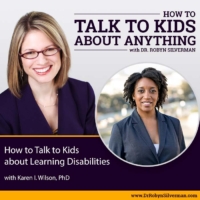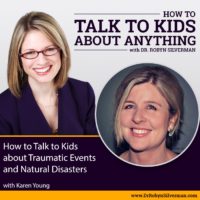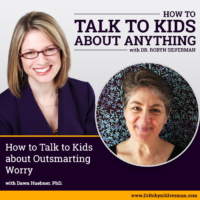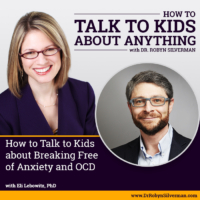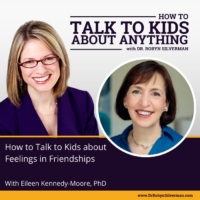Podcast: Play in new window | Download
Subscribe: Apple Podcasts | RSS | More
How to Talk to Kids about Learning Disabilities
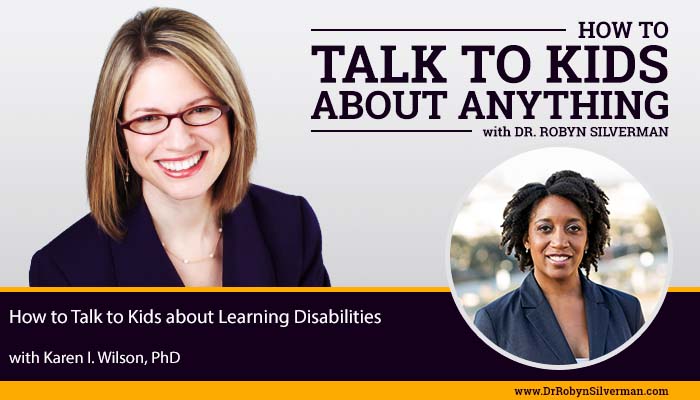
This podcast will focus on how to help struggling kids reach their full potential.
Approximately 5% of school aged children have a learning disability and 13% of all public school students receive special education services. Another 15% are struggling due to an unidentified learning or attention issue. Struggles can look different in different children at different times of their childhood. Their struggles may be an issue with listening, concentrating, motivation, focus or other under-developed executive functioning skills. Children with learning disabilities not only cope with the disability itself but often misunderstanding of the disability. People may think that their lack of concentration is due to laziness, for example. They may believe that their impulsivity is linked to rudeness or feelings that their needs and wants are more important than other people’s needs and wants. So it’s not surprising that sometimes, with misunderstanding comes mislabeling. “That child is rude.” “So and so is a lazy child.” Mislabeling can linked to behavioral problems and can cause a lot of anxiety in children as they struggle to either prove someone wrong—or, prove others right as a self-fulfilling prophesy. Children with learning disabilities also must cope with teachers, administrators and parents jumping to an intervention that may not address the actual problem. How do we talk to kids and help kids who are struggling with learning disabilities so that they can reach tier potential and achieve their goals? For this, we turn to our guest, Dr. Karen Wilson.
Dr. Karen Wilson is a Clinical Neuropsychologist, Assistant Clinical Professor (Voluntary) at the Semel Institute for Neuroscience and Behavior at UCLA, and the Founder of ChildNEXUS.com, a digital platform that connects parents who have children or adolescents struggling with neurodevelopmental or social-emotional issues with professionals who provide services. Dr. Wilson has shared her expertise in a broad range of media outlets: television, radio, podcasts, print, and online. She is a sought-after speaker and has been invited to address a multitude of audiences including parenting groups, educators, and professionals attending national conferences.
Important Messages:
- Kids get labeled- then pick up on those nonverbal cues in their environment. Could be a self-fulfilling prophesy. They see the eye-rolls during reading time. Charts- labels in red, yellow, and green- and see kids who can’t get out of the red and the teacher is then announcing to the whole class that this child is not performing at the level that they should. They are hearing loud and clear that they are not doing what they are supposed to be doing at any given time.
- We know that many children are struggling these days with learning, processing and social difficulties. As I mentioned in my intro, sometimes adults will see these struggles and rationalize the difficulty through a lens of typical neuro-development. You mentioned in the past, for example, that “we might say that they’ll grow out of it, they’re lazy, or they’re the youngest in the class. We are doing them a disservice when we do this.”
- We have to stand up and let people know that we have to pay attention to the difficulties that these children are experiencing and you have to validate the experience. If a child is telling you, ‘this is hard for me,’ you don’t want to give them the message that if they just work harder, it’ll go away. Validate the struggles.
- Document the observations. Between teachers. With parent. Are you seeing the same thing as I am seeing? Then have the conversation with the soccer coach and ask the coach, “my child’s teachers are saying that my child is having trouble paying attention in class…are you also seeing this on the soccer field?” Adds information. Can go to the next step.
- Next step: Evaluate. Is this child having a struggle that’s making it difficult for them to reach their full potential and demonstrate what they know.
- Messages for parents/teachers- it’s definitely challenging for teachers/parents- but remember, it doesn’t compare to the child’s frustration. You have to be in tune. If you are feeling frustrated, you are probably mirroring that child’s frustration. That’s a good time to pause. “If I am experiencing frustration because of behavior X, then what is it that this child might be experiencing as well?” Child’s frustration, anxiety, concern about what they are experiencing.
- Behaviors mask underlying difficulties. Might get silly, might look distracted, might bother others. For example; if they have trouble with reading, might get up repeatedly to go to the bathroom in reading group. Child can’t sit still because of motor restlessness, have to get up and sharpen pencil numerous times per day. Those behaviors might interrupt the flow of the day. Teacher needs to get through the material. Red flag- underlying issues (like Mona Delahooke- iceberg behaviors). Behaviors can be misconstrued as disruptive on purpose- rude. Thinking to self; “the know what I have said and now are choosing to get up during class even after we have established the rule). May be using it as a strategy for social survival! Can we conceptualized and interpreted as defiance. Might not even be an active behavior but NOT starting the work that they have to do.
- Executive function. Trouble with writing. Staring at blank page. But maybe has great ideas- but doesn’t know how to get started, where to start, doesn’t know how to organize the information, how to get information onto the page. (Noah’s story about art class “draw a different world” and a blank page)
- What do you do when a child can’t get started? Not producing. (1) Understand. Why are there no words on the page. Any questions of what you need to do? Can you repeat instructions? If they can repeat instructions, then there is something else going on. (2) What are you thinking about for this assignment? What are you thinking about writing/drawing for this assignment? Get them talking. Perhaps they will reveal “I don’t know where to start.” Or might say “I have an idea about writing about Mars, but I’m not sure if I should draw the picture first or write an outline, etc. (3) Scaffolding. “Those are great ideas, let’s start by writing some of those words down.” “Let’s just start with that sentence.” You are helping them get started by activating the neurons in the frontal lobe that are responsible for task initiation but you are giving them some assistance.” Be a support system for your child (See Harold Kaplowitz interview on The Scaffold Effect). Ask questions to get them to be more concrete. A neurotypical person might know how to prompt and what they see when we give elusive questions- but when a child is neurodiverse, the prompts can be the very thing that helps them move forward.
- Sensory child- materials in front of them might help them. Is it fuzzy? Is it spikey? Make it multi-modal. It’s about engaging the child. Concrete. They might say, “I’ve never been to Mars” “…What do you think it might be like?” “How might it be different than here?” Initiating the process.
- Sometimes fear of making mistakes. They don’t want to write the wrong thing on the paper. So get a piece of scrap paper and have them write it all out there. Once you feel you know what you are going to write about, then you can put it in the booklet.
- Physical activity. Meet the child where they are. You have to break big tasks down into small chunks. So not- dribble down field, pass to another person, then receive the shot back, then shoot goal. Too many tasks. It may be, when the ball comes to you, kick it in the net. Add on slowly. Make it concrete. Show them how high to kick it. Put a cone in the corner and have them kick it into the cone in the corner. They have something to focus on and aim for that’s concrete.
- “It’s not in the child’s control to not remember at the right time. Those kids might need reminders. Don’t call it out in front of everyone. It should be about everyone.” So don’t say; “Johnny, pay attention.” Say, “everyone needs to pay attention to this…”
- Executive function- goal-directed behavior. Getting brain ready to start a new behavior, prioritize, plan, hold info in head while doing a task.
- Disorganized child? What can we do to assist with development of different executive functioning skills? Model for child- executive functioning skills. Help them organize for tomorrow. Do you have everything? Check list. “OK, let’s make sure you have your math book, your mask, your pencil case…” Once you do this over, they can take over and do the check list by themselves. Eventually they won’t need the check list. In working memory. Then put near door. Morning is chaos when you don’t have it ready the night before. Model it.
- Create the time to alleviate the stress. But, sometimes you just need to do it for your child because it’s less stressful. Then get up earlier the next day to allow them the time to try.
- “Every time kids learn something new, they are causing changes in their brains.” We reward them for it. Dopamine release. They get excited. They want to do it again. Felt good—and they did it on their own. Use verbal rewards. “You got everything in your backpack and I didn’t even have to remind you! Remember last week when you were having so many struggles with that? You were really frustrated because you forgot your math book? Well, you got it this time! And I’m really proud of you for that. You’ve been working really hard!”
- Children can struggle with one or more things at the same time. And they can interact and make it more complicated. If a child has anxiety and a learning disorder, the intervention for the learning disorder is not enough. The anxiety also needs to be addressed. If a child is struggling with learning and a child also has anxiety- then the anxiety can exacerbate the difficulties the child is having with learning.
- Use a professional to determine if this is anxiety that needs to addressed by worry and anxiety. You can address anxiety- but you first have to know it’s there. If you don’t know, you are guessing, and you aren’t getting the help the child needs. If you are treating it like it’s anxiety but it’s actually a reading struggle, then that’s problematic. Get the underlying issue. Get the professional guidance you need. Treatment plan. Educational plan. (Again goes back to labels. The child isn’t “lazy” but maybe has anxiety regarding speaking in front of others). If it’s anxiety and it’s untreated, you can’t even address the other things that are the fall-out because of the anxiety (not speaking up, opting out, etc).
- Fear of making a mistake OR executive function issue? Have to know what it is to treat the right thing!
- Sleep: We know that we feel better when we get enough sleep and we’ve heard that sleep is important. Your work highlights that as human beings, we spend approximately one-third of our lives in a state of sleep, yet 70% of American kids and adults get insufficient sleep. When kids don’t get enough sleep, we wind up with poor attention or other possible issues in school. One thing that parents have control over is helping kids manage sleep. When you are sleep deprived, you are irritable. Poor self regulation. Exhausted. Emotional regulation is issue. Big emotions and can’t manage- sleep is a big contributor to emotional regulation and kids! Is it ADHD or sleep deprivation? Problems with attention and executive function. Between 9 and 12 hours of sleep. Necessary- encoding of memories. Learning. Healthy sleep habits. Model. Sleep schedule. Strict bed time. Screens off. Routine. Reading time. Brain to prepare for sleep, settle. Important in way the brain develops. Sleep is needed for that process.
- Why can’t they sleep? Book too stimulating? Room not dark enough? Anxiety? Worried about tomorrow? Friendship issue? Understanding. Seek to understand. Important to have enough sleep. What’s going on?
- How do we talk to kids about their learning disabilities? (1) Validate the struggle. “I have seen you work really hard on reading and I know you are still struggling.” (2) Normalize it. “Do you know that a lot of kids have difficulty with reading? When I was a kid, I really struggled with…” Sibling. Cousin. (3) Talk about their strengths. Highlight what’s going right. “And you are very strong in math and some kids have trouble with that.” Instead of generalizing- specific. Where they are strong. Highlight things they do well. (4) Hope: “I want you to feel better about reading. I don’t want it to be a struggle. There is a person who works with kids who struggle with reading. I’d like you to work with this person so that this person can give you strategies so it’s not so hard for you.” We are going to work on this together. This is what it’s going to look like. So not scary. There’s a person who’s whole career is devoted to working with kids who struggle in reading- there are so many people in the same boat!
- Attention-based. Different for those with a diagnosis- ADHD vs don’t. Normalize it. “I get it. This is difficult. The dog is barking. Your sister is running in and out of the room.” Then make sure there is hope. We are going to change some things. Better focus so you can better learn.” Work on this together. We’re all going to find ways together to work and pay attention. (1) Empathize. (2) Normalize (3) Strategies. (4) Hope.
- The most important the most important thing for parents to remember when parenting kids with learning disabilities is to connect with their child so that they can understand the struggles that they are experiencing and then provide hope that support is available.
- Top tip: When kids are struggling, there is some stigma of what that could be, once they know what the struggle is, they can work with the child to alleviate the struggle. Socially or with learning. Seek to understand what the struggle is so we can get them the appropriate help.
- Normalizing intervention: All kids struggle in different ways. And for some kids it’s going to impact them in a more significant way. Realize all kids struggle. Normalize it. Especially for those who are experiencing anxiety or self concept issues. Even kids and adults who are talented in their field—they need coaches! You don’t get on the field without a soccer coach.
- Tell stories! Even Simone Biles has a coach!
Notable Quotables:
- “That is my soap-box. We have to stand up and let people know that we have to pay attention to the difficulties that these children are experiencing and you have to validate the experience. If a child is telling you, ‘this is hard for me,’ you don’t want to give them the message that if they just work harder, it’ll go away.”
- “While parents and teachers might get frustrated, we have to realize that it doesn’t compare to the child’s frustration.”
- “Executive functioning is a term that describes a number of different things- it’s an individual’s ability to do what it takes to achieve goals.”
- “Model organization for your child and then they can internalize it and execute it on their own.
- “Every time kids learn something new, they are causing changes in their brains.”
- “If a child is struggling with learning and the child also has anxiety- then the anxiety can exacerbate the difficulties the child is having with learning. You have to address the anxiety and the learning difficulty.”
- The most important the most important thing for parents to remember when parenting kids with learning disabilities is to connect with their child so that they can understand the struggles that they are experiencing and then provide hope that support is available.”
- “Seek to understand the reason why the child is struggling so we can get them the appropriate help.”
Resources:
- ChildNEXUS.com
- WestLANeuro.com

